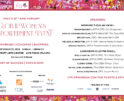
Seeing Your Femininity as a Strength in the Workplace
I saw an infographic recently on a colleague’s social media page that said, “I close deals in heels,” and after smiling at my screen, I clicked “save image”. Closer to the start of this century, I was a professor in a School of Business and Management at a private university on the West Coast. In my Women in Management class, we read books like Gail Evan’s Play Like a Man, Win Like a Woman and Lois P. Frankel’s Nice Girls Don’t Get the Corner Office. The subject matter of both books was all the business rage and made the books bestsellers.
While the advice therein was useful in understanding the business playing field where men traditionally had created the rules and to comprehend why men and women weren’t actually looking at business interactions in the same light, the books did not encourage women to use what came more naturally to them, such as the skills of collaboration, intuition, compassion and empathy to create their success.
Fast forward almost two decades and women have made some strides into c-suites, onto Fortune 500 boards and are increasingly starting their own businesses. (Inc. says entrepreneurship by women is up by 114 percent from twenty years ago.) What this means is that while playing like a man has worked when businesses were mostly a man’s game, the influx of women has helped the game become co-ed, or a mixture of both masculine and feminine energy. And successful leadership, as well as success in relationships, needs both.
In The Feminine Revolution: 21 Ways to Ignite the Power of Your Femininity for a Brighter Life and a Better World, authors Amy Stanton and Catherine Connors start the book with a Joan Didion quote: “Remember what it meant to be me: that was always the point.” The fact is that when we try to act like a man in business, when we dress in masculine looking business suits, wear flat shoes when we prefer heels, act more direct and assertive and subjugate our emotions, we aren’t being our authentic selves. And when we aren’t our authentic selves, we rob ourselves of our full power.
Stanton writes, “Instead of suppressing your feminine qualities because society may view them as less valuable, try tapping into those qualities personally and professionally as a source of power.” Last September I met a woman who is excelling at that. At the Lucy Hobbs Celebration of women who work in dentistry, one of the award winners, an Ann Arbor, Michigan dental superstar named Sabiha Bunek admitted to the audience that she loves wearing dresses and heels and looking glamorous. “I had to quit working for a practice that started to require us to wear scrubs and tennis shoes every day. I couldn’t do it. It isn’t me,” she said, laughing. Bunek understands that her strength lies in being her feminine self — however she defines that on her own terms — and that is what is making her not only a sought-after dentist, but leader of researchers, editor-in-chief of an industry publication, a frequent international public speaker and consultant.
But maybe heels and dresses aren’t your thing but a particular style of attire or special accessory makes you feel like you can take on the world. Or maybe it’s the way you stand or sit or carry yourself or the fancy underwear you wear that no one but you and your significant other sees. Take stock for a moment: What makes you feel feminine and in your power? What are your innate strengths? What makes you uniquely you? And how can you use those qualities in your work? For example, if you are empathetic and utilize those skills, you will relate better to co-workers, customers and clients when you show them they are being heard and understood. Leaders who strive to understand the goals, passions, fears, aspirations and insecurities of the people they lead can more easily help their team members overcome challenges and soar with their strengths to bring more value to the business.
It’s fine to show emotion when it is appropriate, to embrace glamour and/or wear bright colors, to show weakness as well as strengths and to be yourself in the workplace. In the movie “I Don’t Know How She Does It”, Sarah Jessica Parker plays a high-powered hedge fund manager who loves her job and her success climbing the corporate ladder, but she is torn between work and her home life. At one point her character says, “Trying to be a man is a waste of a woman.” So embrace your womanness and create your success your way.
For me, that means wearing a silk scarf and donning heels to close my deals.
By Jill L. Ferguson
Photo by Andrew Tanglao
Jill L. Ferguson is the author of nine books including Creating a Freelance Career and the forthcoming A Salary Cinderella Story (Or How to Make More Money Without a Fairy Godmother).
Recommended
-
Getting What You Want At WorkDecember 20th, 2024
-
Fall 2024 EventNovember 19th, 2024
-
Pink ProgramOctober 20th, 2024
-
Influential LeadershipOctober 20th, 2024
-
REGISTER HERE FOR THE UPCOMING...September 19th, 2024















